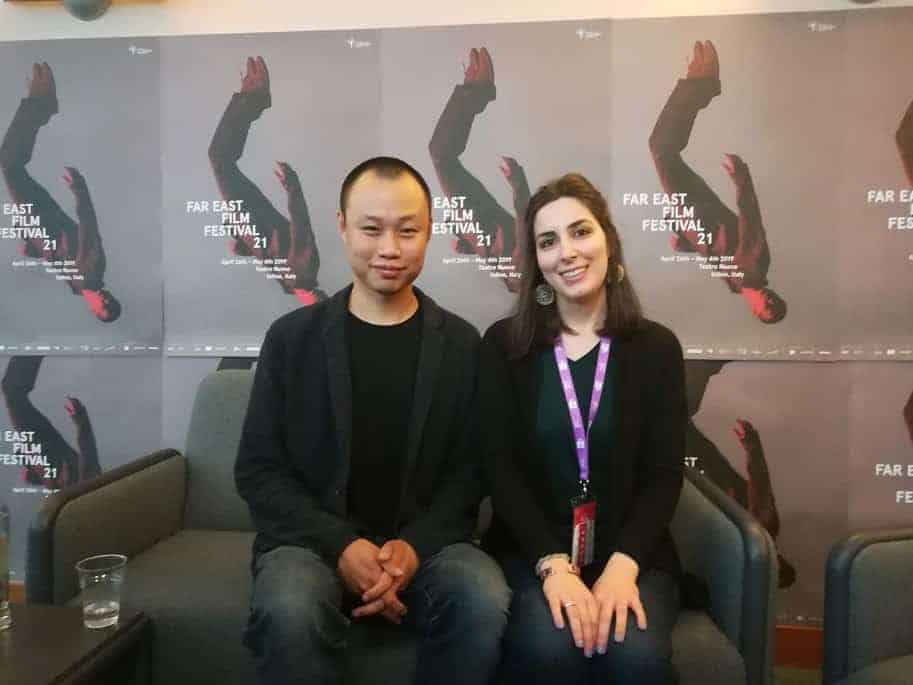Wu Hao (born 1972) is a documentary maker and blogger known as Tian Yi. Before he became an award-winning documentarian, Hao Wu was a product manager in Silicon Valley and China. He left his career in tech to pursue his true passion: telling the story of China's youth through film-making. His first film, “Beijing or Bust”, documents the trials and tribulations of six American born Chinese who chose to return to Beijing and the cultural adaptation they faced. His second film, “The Road to Fame” was released in June 2013 and follows students at China's top drama academy, as they prepare to stage a Chinese version of the musical Fame. His work, however, isn't without controversy. In 2006, he was detained for five months by Chinese authorities while working on a film about an underground church in Beijing.Following his detention, Global Voices co-founder Ethan Zuckerman started a new blog to monitor the status of Hao's detention, which was covered widely by blogs and news outlets around the world. Hao was released on July 11, 2006.
His latest film, “People's Republic of Desire” explores the lives of Chinese webcam streamers and their struggle to be successful.
On the occasion of “People's Republic of Desire” screening at Fantasia International Film Festival , we speak with him about why he thinks this is an important story to tell the protagonists of the documentary, YY.com, live streaming and its success in China, and his future plans.

Can you tell us how you came up with the idea to do this documentary and why you think it's an important story to tell?
Back in 2014, when I was researching different topics for my new film, someone told me about this live streaming company called YY. It was already listed on NASDAQ and worth billions, but still relatively unknown among the general population in China. I did some digging and found that YY was very popular among China's young and lonely (“loser”) generation. It also attracted many nouveau-riche types. I was shocked by how blatantly the rich showed off their wealth by spending tens of thousands a night on digital gifts, and how unabashedly the poor “losers” worshipped the rich. Even though live streaming was a pure online phenomenon, I sensed that real human desires were powering its growing popularity. Moreover, as someone who had worked for many years in the internet industry, I had always wanted to find an opportunity to examine human beings' relationship to technology. This is rarely approached in the documentary form, so I was intrigued and decided to pursue this topic.
User icons and virtual rooms are used a lot in the film. Why did you decide to use computer graphics and 3D icons to tell this story?
I decided early in production to recreate the virtual world with 3D animation. The actual live streaming interface is busy and confusing, even for native Chinese speakers, and the crazy feel does not translate well across languages. I want the audiences to be able to immerse and experience, perhaps being bewildered at the beginning just like I was, but gradually understanding this bizarre universe more and more. Using 3D animation allowed me to “move” the camera and guide viewers' attention.

When you interviewed the CEO of YY.com, how did you find he welcomed a chance to be a part of this documentary? Was it hard to get an interview with him?
YY was receptive to my effort to make a documentary from the very beginning. Back in 2014, live streaming was still a niche technology phenomenon in China, so the company was welcoming any media attention. They honestly feel that they are doing a good thing – while making good money in the process – by satisfying their users' desires unmet in real life.
Do you know what Shen Man is doing now? In the film she left YY. Did she return? Do you know what happened to her?
Yes, she did return. Like their diaosi “loser” fans, most live streamers don't have good education and came from families lacking both financial and social capital to help them in the cut-throat Chinese economy. They feel trapped and want to leave the virtual world. But in the real world, they don't have any marketable skills to make a decent living. So they stay on the live streaming platform to milk as much money as they can, until they are totally abandoned by their fans.

I found you made me really care about Big Li and Shen Man. Did it take a long time to get close to both of them so they trusted you or was it a quick process?
Big Li always wanted the spotlight so he was very open and honest in front of my camera. He never shied away from revealing his inner thoughts, or what viewers would normally consider “vulgar” aspects of his life. I find that extremely endearing.
Shen Man was very open at the beginning of the production because she found being interviewed and followed interesting. That was before live streaming really took off and Shen Man became a big internet celebrity. But later on we went through a phase where she shut down access. She didn't realize how long I would follow her, and she found my camera intrusive when she live streamed in her bedroom, with all her flirting and trash talking in front of the webcam. I persisted and luckily she allowed me back in in the end.
Do you know what Big Li is doing now? Do you keep in contact with him or Shen Man?
I'm keeping in contact with them both. Big Li is also still live streaming, though his popularity has definitely waned since his heyday. He's trying to invest his money in some real-life business (e.g., restaurant) so he can leave this platform soon. He's also back with his wife.

What do you think is the future of YY? Do you think it will be around for a long time or is it a passing trend?
In 2016, live streaming exploded in China. Now they are many companies focusing on this since it is so lucrative. YY is still arguably the No.1 live streaming platform in China, though it is facing increasing competition from newcomers. It is still extremely profitable, and it is worth about 6 billion USD in stock valuation.
Regardless of how YY does, live streaming is here to stay in China. It has become a mainstream media form and has expanded beyond live entertainment and gaming, to news, education and eCommerce.
In the film. I noticed that a lot of the fans you speak with are living in poor conditions or don't make a lot of money to live on. Do you think the money these fans spend on YY is similar to a gambling addiction or something different?
I don't think I'd call this an “addiction,” in the clinical sense. I think this is very similar to young people everywhere who spend all their savings to buy albums or go to concerts of their pop idols. The only difference is that China's live streaming platforms have designed the system in a way that makes it so easy to spend money and so instantly gratifying.
What is next for you? Do you have a new film you are working on?
I'm working on a short film, a personal documentary about traveling between the Chinese and American cultures. Meanwhile, I'm researching new topics for a long film. I'm hoping that I can continue my journey to examine man vs. technology in films.















